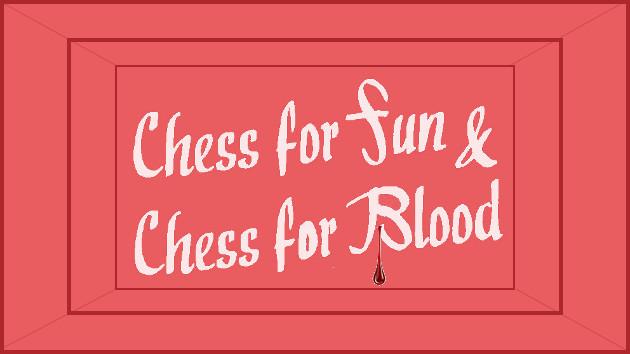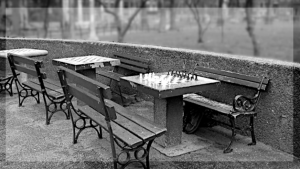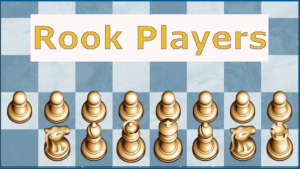
Fun & Blood

Edward Lasker published his delightful book "Chess of Fun & Chess for Blood" in 1942. In this book he examined Chess from the different perspectives of various amateurs in juxtaposition to that of serious tournament players and professionals.


HESS IS A LOT OF FUN
if you bring to it the right attitude and a sense of humor. Of course, what is considered fun depends a good deal on the intellectual level and emotional make-up of the person being amused, just as in any other type of recreation. I recall a comparison a friend of mine once drew between the fun in Chess and the pleasure a smoker derives from his cigarettes. One man will smoke one after another just for the kick he gets out the taste. Another——an artist perhaps——will blow rings and enjoy the various shapes they assume and associate them with forms he has used or might use some day in his work. A scientist, watching the ashes grow longer and longer, might muse on the transformations of energy or of the chemical changes taking place in that little roll of tobacco.
Similarly, there are Chess players who play game after game just for the fight there is in them. To others, the beauty of the combination, the crystal clear logic of a maneuver carried through, appeals more than mere victory. A scientist might be intrigued by discovering in the game curious applications of physical laws which govern the conversion of potential into kinetic energy as the various Chessmen execute their threats. The military strategist might draw parallels between the applications of his maxims to real war and to the bloodless battle on the Chess board. When it comes to getting fun out of Chess it does not really matter how well you play. If you do not like to be beaten with monotonous regularity, you can always find someone who plays as badly as you do. And you can gloat over your victories and find excuses for your defeats in much the same manner as had been practiced since dim antiquity by players much better than yourself — not excluding some of the masters of the game.
There are people who consider playing any game, including Chess, pure waste of time. I cannot help smiling when I hear someone voice that opinion. It makes me think of a fine remaark with which Clarence Darrow introduced a talk on his favorite books. He said: "We are born and we die; and between these tow most important events of our lives more of less time elapses which we have to waste somehow or other. In the end it does not seem to matter much whether we have done so in making money, or practicing law, or reading, or playing, or in any other way, as long as we felt we were deriving a maximum of happiness out of our doings."
I quite agree with him. I do not blame anyone for wasting his time the way he likes it best; although, of course, it is my private opinion that my own time-wasting plan, which includes a moderate dose of Chess, is the best.
If an Einstein thinks playing games too trivial I can appreciate it. The truly great ones of this world have good reason to be jealous of their every minute, for mankind's progress is bound up with their endeavor. But the disdain fo games in the average mortal is apt to indicate merely a somewhat unbalanced opinion of the importance of things.

Let's go a step further-
The story is told how Samuel Reshevsky, a player of World Champion potential and reputedly a nice man, once made a losing blunder against a teen-aged boy during a simul and in a fit of rage and disgust, swept the pieces off the board. His over-the-top reaction to this totally inconsequential game illuminates his unfettered need to win above all else, even when it doesn't really matter. This isn't Pick-on-Sammy Day and the story is here just to illustrate the power that the will-to-win holds over certain individuals. This same will-to-win also gives the possessors a certain edge in any contest and any successful player probably has it to a degree beyond that of the average person.
Professionals who sink or swim by their results must, by necessity, have such an attitude. However, as shown above, this attitude doesn't come and go when needed but rather pervades their very being, at least while engaging in Chess.
Many amateurs have that same attitude and not just in tournament games, but in casual games, even blitz games. The importance of the game itself generally seems to make little difference in respect to such individuals' attitudes toward winning.
—— These people play Chess for Blood. —— 
There are other people who have a more lackadaisical approach. While winning is nice, and indeed one of the purposes for playing, for those folks the act of playing, the creative process itself, is of equal or greater importance. Winning (or losing) isn't tied as much to their ego and they would often rather lose an exciting game than win a boring one. These people are seldom at the top of the ratings ladder. They often enjoy puzzles and problems as much as they enjoy playing and when they do play, they often try unusual or risky moves just to see what might happen. Often they're fond of gambits. They might be good players but usually lack that extra "oomph" to become really successful players.
—— These people play Chess for Fun. —— 
So, do you play for fun - or do you play for blood?



